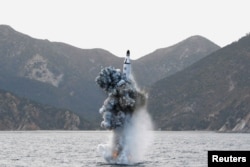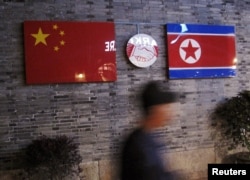North Korea’s relentless pursuit of nuclear weapons is forcing both its allies and adversaries to rethink their strategies for maintaining regional peace and security.
On Thursday, North Korean state media denounced U.S. President Barack Obama’s policy of “strategic patience” as ineffective. The policy includes imposing isolation and increased economic sanctions to pressure the Kim Jong Un government to halt its nuclear program and agree to renew lapsed denuclearization talks.
“It has resulted in us enhancing our nuclear weapons capability and becoming a confident nuclear power state equipped with the most powerful nuclear attack capabilities," said a KCNA state TV announcer.
Nuclear activity
On Friday, 38 North, a group that monitors satellite images of North Korea’s nuclear activities, said there is currently movement at all three tunnel complexes at the Punggye-ri nuclear test site involving a large vehicle and personnel.
Analysts with the group, which is affiliated with Johns Hopkins University's School of Advanced International Studies, speculate that this increased activity could indicate preparations for a new nuclear test, or it could be follow-up work to the last test, which was conducted on September 9.
In addition to already conducting an unprecedented two nuclear tests this year, Pyongyang has advanced its land-based and submarine-based ballistic missile capabilities with numerous launches in the last six months.
Chinese frustration
China has tried to strike a balance between opposing the North’s nuclear program and keeping the authoritarian Kim in power as a stable buffer zone to counter the regional influence of the U.S. and its ally South Korea.
Beijing supported the last round of U.N. sanctions in March and voiced support for further measures after the September nuclear test, but it has been reportedly lax in enforcing trade restrictions.
The government of Xi Jinping continues to hold this moderate position of urging all sides to resolve their differences peacefully through dialogue, but the Chinese public is growing more divided over whether tougher measures are needed.
Sun Zhe, a U.S., China relations scholar and co-director of Columbia University’s China Initiative, said many in China are frustrated with North Korea’s nuclear provocations, and he is seeing increasing support for some sort of military intervention in the Chinese media.
“In the [Chinese newspaper] Global Times people argue that China should make a contribution, China should do something to support the idea of surgical strikes decapitation,” said Sun Zhe Thursday at a forum organized by the Center for Strategic and International Studies in Washington.
With 90 percent of North Korean trade flowing thorough China, Beijing could also impose drastic economic pain on its ally by strictly implementing existing sanctions, banning all coal and other mineral exports and shutting down all Chinese businesses with any ties to the North.
While Beijing is not prepared to abandon Pyongyang yet, Sun Zhe said, it realizes the situation on the Korean Peninsula is growing more dangerous.
U.S. priority
Washington’s overriding priority should be to prevent North Korea from developing a reliable inter-continental ballistic missile armed with a miniaturized nuclear warhead that can strike the U.S. mainland, according to a recent task force of security analysts organized by the Council on Foreign Relations (CFR.)
The CFR task force recommended that Washington offer Pyongyang incentives like immediate food aid and a possible reduction in U.S., South Korea joint military exercises in return for a moratorium on nuclear and missile tests.
These recommendations are conditioned on North Korea demonstrating a commitment to address the denuclearization issue, and offer the possibility of further concessions down the road, including a formal peace treaty and the normalization of relations, if real progress is achieved.
Other former officials and experts dismiss the engagement option as appeasement that will end up subsidizing the North’s nuclear program, and reinforce the message that coercion works.
Robert Gallucci, a former U.S. ambassador-at-large who was the chief U.S. negotiator during the North Korean nuclear crisis of 1994, said pursuing negotiations is still the best option available.
And he said the international community should not be deterred by Kim Jong Un’s stated position that his country’s status as a nuclear power is non-negotiable.
“I understand that they have wanted to convey the idea that they will never give up their nuclear weapons program. My view is that just raises the price,” said Gallucci at a recent Johns Hopkins University forum in Washington.
At the same time that the CFR task force is recommending increased engagement, it is also endorsing tougher sanctions and deterrence measures to respond to the North’s continued provocations, and even calls for military preemptive strikes against its nuclear facilities if an attack seems to be pending, or if the North sells nuclear weapons technology to other countries or terrorist organizations.
Youmi Kim contributed to this report.











